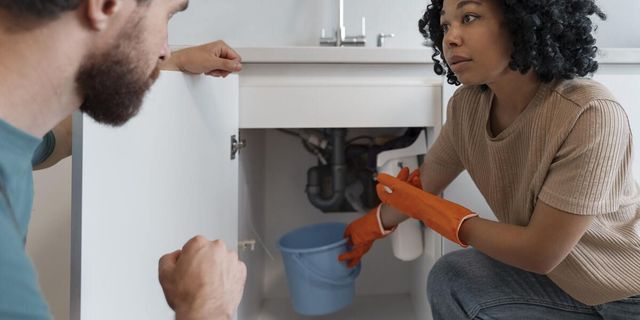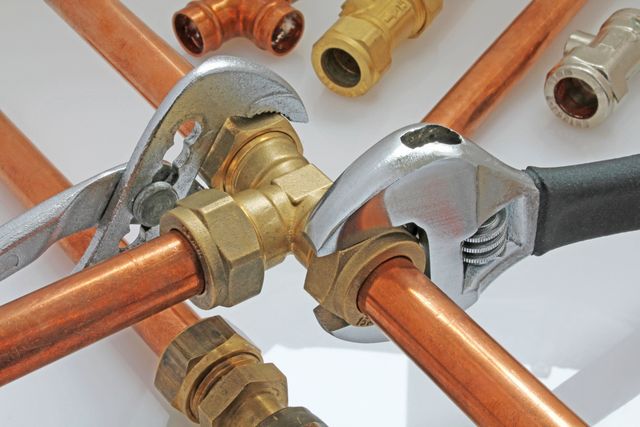Have you been hunting for help and advice involving Plumbing Emergencies: Tips on What To Do Before?

Pipes emergencies can strike any time, causing tension and possible damage to your home. Whether it's a ruptured pipe, a clogged up drainpipe, or a dripping faucet, understanding how to take care of the scenario till a professional plumbing arrives can save you from additional difficulties. This short article gives essential emergency situation plumbing tips to aid you mitigate damage and restore control during a plumbing crisis.
Turn Off the Supply Of Water
The primary step in any type of pipes emergency is to turn off the water system. For local problems, such as a dripping faucet or bathroom, shut off the valve near the fixture. In the case of a major leakage or ruptured pipeline, situate your home's major water shut-off valve and turn it off quickly. Recognizing the area of these shutoffs ahead of time can conserve useful time during an emergency.
Address Small Leakages with Short-term Solutions
Tiny leakages can swiftly become significant troubles if left untreated. Utilize these short-term fixes until specialist aid shows up:
While these repairs aren't permanent, they can aid lessen water loss and damage.
Unclog Drains Securely
A stopped up drain can be a frustrating and untidy issue. Below's exactly how to tackle it:
If these techniques don't work, prevent utilizing extreme pressure, as it might worsen the obstruction.
Handle Overflowing Toilets
An overruning commode can create immediate chaos. Right here's what you must do:
Shut down Your Water Heater
In specific emergency situations, such as a burst pipeline, it's important to turn off your water heater. This stops overheating or damages to the system when water quits streaming. Switch off the power supply to the water heater (electrical or gas) and allow it cool off to avoid possible dangers.
Temporarily Quit a Ruptured Pipeline
A burst pipe can bring about significant water damage in mins. To alleviate the issue:
Call an expert plumbing right away to address the trouble completely.
Deal With Frozen Pipes Meticulously
In chillier climates, icy pipelines are a typical emergency. If you believe an icy pipeline:
Protect against More Damages
Taking fast action to reduce damage can conserve you money and time over time. Right here's how:
. Have an Emergency Situation Pipes Kit
Prepare a standard plumbing emergency situation kit to handle minor concerns properly. Your set ought to include:
Having these devices available can make a substantial difference in your capacity to manage emergency situations.
Know When to Call an Expert.
While quick fixes can help momentarily, certain pipes issues call for instant specialist interest. Call a plumbing if:.
Quickly calling a specialist guarantees the concern is dealt with appropriately and prevents additional complications.
Final thought.
Plumbing emergency situations can be frustrating, however with the right understanding and devices, you can manage the situation successfully till aid arrives. By shutting off the water, dealing with little leaks, and using temporary repairs, you can decrease damages and maintain your home safe. Keep in mind, these pointers are temporary services; constantly consult a certified plumbing professional to handle the root cause of the problem. Prep work and fast thinking are your best allies in any type of plumbing emergency.
8 Helpful Tips for Managing Plumbing Emergencies at Home
If your plumbing system hasn’t failed once, wait for it because almost everyone has a story to tell. Sometimes, it could be simple emergencies such as a leaking pipe, a blocked cistern, or even a big burst pipe. In situations like this, you need to have some handy tips to save you some money and from possible damages.
Take care of minor issues early.
Sometimes, you could have avoided an emergency by taking proactive measures while it was still early. Some major plumbing emergencies can be a result of an ignored minor issue. We recommend that you have items like plumbing tapes and other related items. A plumbing tape can allow you to manage minor leaks before the plumber arrives.
Cut off the water supply.
This tip is essential in almost any type of leakage problem. For problems like minor leakages in the toilet or kitchen, turn off the supply that takes water to the affected pipes. If the leakage is a major pipe, you must shut off the supply valve to the entire building. This will help you avoid flooding your home and neighbors if you share a flat.
Know your plumbing system
Folks typically move into a new apartment without understanding the water supply around the building. This can prove disastrous if a water emergency arises and the plumber is far away. The previous tip will prove useless if you don’t practice this one. More importantly, know where your water shut-off valve is located – you’ll need that knowledge to prevent potential home floods.
Have some common handy tools
There are lots of plumbing emergencies that you can handle without hiring a plumber. That’s why you must keep some tools available always. Some tools that you can use to fix simple plumbing emergencies easily include plumbing tapes, screwdrivers, thread seal tapes, plungers, pliers, tape measures, and rubber gloves.
Insulate your pipes from cold
You’ll save yourself from many plumbing expenses if you protect your water pipes from the cold. This is because of the harmful effects that cold weather can have on your pipes. During winter, your pipes can burst from being overly expected to freezing temperatures. So, make sure insulators are there to keep the pipes working correctly.
Avoid practices that will clog your toilet.
Many people indulge in practices that can damage the plumbing system of the entire building. One of these is when they use their toilet to dispose-off garbage. They flush all kinds of things, such as paper towels, bandages, hairs, female sanitary products, etc., down the toilet. This will block your toilet in the long run, incurring unnecessary expenditures. Dump such waste in the trash instead.
Check your dials regularly.
Sometimes, there could be leakages in your home without noticing them in time. So, constantly monitor your water meter dial. If the dial is reading when there is nobody using water, this is an indicator that there is leaking. Check for leaks immediately. Call a plumber as soon as possible if you can’t find any.
https://www.constructionplacements.com/8-helpful-tips-for-managing-plumbing-emergencies-at-home/

Do you appreciate more info about Expert Tips for Emergency Plumbing Repairs? Create feedback down below. We will be pleased to hear your feelings about this content. Hoping that you visit us again in the near future. Enjoyed reading our entry? Please share it. Help others check it out. I truly appreciate your readership.
Call